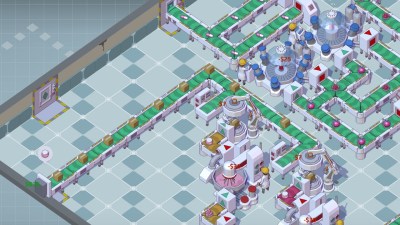There are few games that make us choke up; there are even fewer games that we take the time to play twice before we review. Transistor achieves both - it’s just that gripping.
Transistor is Supergiant Games’ latest game. True to form, it’s an isometric RPG, and it’s instantly recognizable as coming from the team behind Bastion. There are a lot of similarities between the two games, and considering how much we loved Bastion, that’s very much a good thing. Everything about the game screams Bastion, but Transistor always feels like its own game. The biggest difference between the two is the plot; Transistor tells the story of Red - a singer who has had her voice stolen - and her lover, whose soul now resides within the titular Transistor, your talking sword.
The game starts with Red pulling the Transistor from a man’s corpse. It’s made quickly apparent that the two are close. It’s not done in a heavy-handed, robotic “you are my wife and I am your husband and thus we have a connection” fashion that we see in a lot of games and movies these days. Instead, the Transistor is simply your primary lens through which you view the city of Cloudbank. Red may be a singer - and we’ll come back to Ashley Barett’s vocal performance as Red in a bit - but she has been silenced. She has had voice “stolen”. You never quite learn how or why her voice was stolen - and that’s fine. It doesn’t need explaining.
What you need to know is that the Transistor doesn’t need Red to speak to know what she’s thinking. Transistor is a rare game in that the dynamic between two lovers is believable. The Transistor is constantly pushing Red to keep moving because the ones who stole her voice are coming to kill her; he will keep her safe, but only on the promise that she never lets go of him. We previously said that Supergiant Games could tell a damn good story with Bastion; Transistor deserves a standing ovation.
The story isn’t told exclusively through your sword however; the secondary lens through which you view the world is the OVC News Stands. These give our protagonists a view into what is happening in the rest of Cloudbank as they escape their pursuers, The Process - who seem to be destroying the city at the same time. When the shadowy organisation known as The Camarata accidentally botched Red’s assassination, the Transistor’s ownership rights moved from your would-be assassin to Red. The Process decided at this point that the city was theirs, and systematically started killing the entire population.
Each news stand gives a news report or an opinion poll; both of these come with the option to vote or reply with a comment - each choice delivering the usual sarcastic dialogue that Supergiant Games is coming to be known for.
The beautiful sleight-of-hand here is that while at first Red uses this comments system to send distress signals and messages of solidarity to the other survivors, she winds up using the OVC Stands to talk directly to the Transistor. He simply replies aloud to whatever she types. The writing in Transistor is brilliant, and the game is entirely captivating - amusing enough considering the sword is used to capture the souls of the citizens of Cloudbank.
As you play, you discover that the Transistor has several abilities; it doesn’t just contain the soul of Red’s unnamed lover - during your playthrough you’ll discover corpses of friends, celebrities and other citizens of note. You can absorb their consciousness into the Transistor to unlock new attacks and abilities. Each person has an attack associated with them, which you can use in one of 4 attack slots; if you decide that their attack doesn’t fit your play style, you can use that attack as an active or passive ability, upgrading other attacks or manipulating the battle area to get through the encounters in your own way. There are many different combinations that you can choose, with multiple options to tackle each and every encounter.
There is an added bonus to trying these multiple combinations; once you use each absorbed person as an attack, passive or active ability you unlock a segment of the character’s backstory. This is an incredibly engaging way of learning the lore that the universe has to offer. At no point does the game explain this to you - there’s no hand-holding in this game; the Transistor is as new to this as Red is, and there is nothing forcing you to try out combos other than your own insatiable need for backstory.
The Transistor, besides being imbued with the souls of multiple dead people, has a second power: the power to slow down time. While this confuses the Transistor at first, who says it’s probably best to pretend that it never happened, it quickly becomes your main form of attack. Red can attack in real-time, but then again so can The Process; when the screen fills up with enemies, with each of them shooting at you at the same time, the screen can get incredibly cluttered. At this point, the advantages of fighting real-time go out the window, and your fight tactic becomes similar to Fallout’s VATS or Red Dead Redemption’s “Dead Eye” targeting - it’s incredibly useful and you will probably find yourself using it a lot of the time - but you don’t have to use it exclusively.
We had two people test this game on both PC and PlayStation 4 - I preferred to stop time and line up crushing combos, such as the triple Void()+Cull() combo which will kill most things in one hit; Brian found that turning the hilt of the Transistor into a gun and shooting everything real-time was more to his style. This duel way of engaging your enemies makes fights pretty engaging for everyone, no matter how you like to play - which makes for a nice change. This truly is a game that anyone can enjoy.
As it transpires, there is one advantage to playing this game on the PS4; it’s not massive, but the Transistor changes color several times as the story progresses. The DualShock 4’s light strip changes color with your sword, which is a nice touch. It also flashes as he speaks during the cutscenes. You may not notice it until you play in the dark, and it has no gameplay application, but it’s just a nice touch; it shows just how much effort Supergiant puts into their games. Other than that though, the game is identical across both versions, and you’ll lose nothing depending on which platform you choose to play it on.
It’s not just the gameplay and story which are truly incredible; the visuals are stunning, with Supergiant Games’ usual isometric perspective and vibrant colors making the world so incredibly enticing and vibrant. Not only is it gorgeous to look at, but the audio… bloody hell, the audio.
The soundtrack is immediately identifiable as Darren Korb’s work; Darren Korb is the mastermind behind Bastion’s excellent score. We had been looking forward to hearing his work on Transistor since the haunting vocals in the original trailer, and we are pleased to announce that Korb has outdone himself on this game. Bastion is not only one of the few games we have given a perfect 10 to, but also has one of the best game soundtracks we have ever heard.
The music in Transistor is not only haunting on its own, but when combined with the immaculate sound of Ashley Barrett’s vocals, you have yourself a contender for your MP3 player’s Most-Played lists; it really is stunning, and you should definitely go and buy it.
All in all, Transistor is incredible. It’s gorgeous, it sounds great, and it’s polished to a mirror shine. The dynamic between Red and Transistor is incredible, and their bond is palpable. The other characters are just as vibrant - be it Sybil, who set in motion the assassination attempt because Red spurned her, or the OVC news reporter whose fate you care about despite never actually meeting her. The writing is as good as the soundtrack, which is an essential purchase for all fans of the game. Transistor never holds your hand. It never once feels forced. After finishing the 7 hour campaign 4 times in one week between us here at Continue Play, we still want more.



